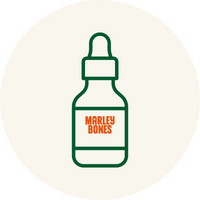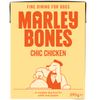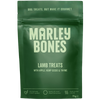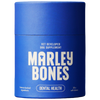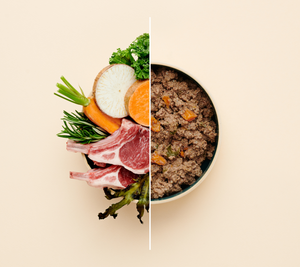Puppy Food vs. Adult Dog Food: Key Nutritional Differences Explained
When it comes to feeding your furry friend, choosing the right diet is crucial for their growth and health. If you've ever perused the aisles of pet food, you've likely noticed that puppy food and adult dog food are clearly differentiated. It's not just a marketing tactic; there are valid reasons why foods are age-specific. Puppies have different nutritional needs compared to adult dogs, primarily due to their rapid growth and development. Puppy food is formulated to support these needs, with a focus on higher protein content, essential fatty acids, and the appropriate calories to fuel their growth and playful energy.

While adult dog food provides the maintenance nutrition necessary for a grown dog, puppy food includes specific nutrients that cater to a growing dog's development. The duration your puppy should be on puppy food varies by breed and size, so seeking guidance from a veterinarian can help you transition your pet at the appropriate time. Knowing the difference between puppy and adult dog food helps you make informed decisions for the well-being of your pet.
Davide Stefanutti, DVM, PhD explains “While the nutritional requirements of puppy and adult dog food are different, they are not mutually exclusive. This means that a food can be carefully formulated to contain all the essential nutrients in the right amounts to cover for both puppies and adult dogs requirements. This can be beneficial: for example, adult dog food does not need to contain omega-3 EPA and DHA to be labelled as complete and balanced, since these fatty acids are considered only conditionally essential, and not properly essential, for adult dogs. In puppies, instead, they are considered essential. So if a dog food is labelled as suitable for both puppies and adults, you know that your adult dog will benefit from the presence of omega-3 in the diet”.
Key Takeaways
- Puppy food offers more total protein and essential fatty acids than adult dog food to support rapid growth.
- The duration a puppy should eat puppy food varies by breed, with a proper transition to adult food recommended by a veterinarian.
- A food can be formulated to meet all the nutritional requirements of both puppies and adult dogs. In this case, the transition between life stages is all about the daily amounts of food provided.
- If a food is formulated only for puppies, you should not feed it to your adult dog, and vice versa. A food needs to be labelled as formulated for both to be safely fed to both puppies and adult dogs.
Is Puppy Food Really Any Different Than Adult Dog Food?

When selecting food for your dog, it's important to understand that puppy food and adult dog food do indeed have different formulations to meet specific nutritional needs.
Key Nutrient Differences:
- Protein: Puppy food typically contains more total protein to support their rapid growth and development. However, it may contain a smaller amount of certain specific amino acids, such as methionine, compared to adult dog food.
- Fat: Likewise, it also has a higher fat content for extra energy. Puppy food also needs to contain arachidonic acid, as well as the omega-3 ALA, EPA and DHA, which instead do not need to be present in adult dog food.
- Micronutrients: Essential for proper development, minerals like calcium and phosphorus, as well as vitamin E, are more concentrated in puppy formulas.
Caloric Density:
- Puppies burn a lot of energy. Their food is more calorie-dense to satisfy their needs.
For optimal health, choose a diet that supports your puppy's growth stages. Once they reach adulthood, either transitioning to adult dog food or modifying the daily amount of food provided (if it’s a meal suitable for both puppies and adult dogs, such as Marleybones meals) ensures they maintain their health without the excess calories. Always consider their individual dietary needs and consult your vet for personalised advice.
What To Look For On Puppy Food Labels
When selecting puppy food, it's essential to scrutinise the label to ensure it meets your puppy's specific developmental needs.
Look for:
- Calcium to Phosphorus Ratio: It should be between 1:1 and 1:6 to support proper bone development. In adults instead it can be up to 2:1.
- Essential Fatty Acids Content: Omega-3 ALA, EPA and DHA must be present in food targeted to puppies. ALA is usually provided by linseeds while EPA and DHA are derived from algae, microalgae or seafood.
Your puppy's nutrition during their formative months sets the foundation for lifelong health. Verify that any puppy food aligns with dietary standards appropriate for their breed size and growth requirements.
How Long Should Puppies Be On Puppy Food?

Puppies have specific nutritional needs during their rapid growth phases. Typically, the transition from puppy food to adult dog food should commence once they reach maturity which can vary by size:
- Small to Medium Breeds: generally reach maturity around 12 months.
- Large to Giant Breeds: may take up to 18-24 months to fully mature.
For a more precise timeline, consider the following milestones:
- Weaning to 6 Months: Intense growth. Puppies should start with specially formulated puppy food immediately after weaning.
- 6 to 12 Months: Continue on puppy food, adjusting portions to their growth rate and breed size.
- 12+ Months for Small to Medium Breeds or 24+ Months for Larger Breeds: Begin the transition to adult dog food over a period of 7-10 days to prevent digestive upsets. If the food you chose is formulated for both puppies and adult dogs, the focus should be on reassessing the portion size.
It's important to evaluate your puppy's body condition and growth to tailor the transition to their individual needs. Remember to consult your vet for advice, especially if you have any concerns or if your puppy has specific health requirements.
Monitor your puppy’s development and ensure that the food you're providing contains the appropriate balance of nutrients. High-quality foods tailored for puppies will support their physical development, including:
- High Protein Content: Essential for muscle growth and repair.
- Calcium and Phosphorus: Vital for proper bone development.
- DHA: An omega-3 fatty acid that promotes brain and vision development.
Regular veterinary check-ups can guide this transition and ensure your puppy thrives during every growth stage.
Do Puppies Need Special Treats?

When you’re raising a young canine, understanding their dietary needs is paramount. Puppies grow at an exponential rate, meaning their energy requirements are significantly higher than those of an adult dog per pound of body weight.
Treats for puppies should not just be seen as indulgences but as opportunities for healthy growth and development. Marleybones treats provide essential nutrients that support bone development, proper brain function, and overall health.
Here are some considerations when choosing treats for your puppy:
- Ingredients: Look for treats that are high in protein and contain healthy fats, as well as fortified with vitamins and minerals like calcium and DHA, which are vital for a puppy's growth.
- Size and Texture: Choose treats that are size-appropriate and not too hard, to prevent choking and ensure that the puppy can safely chew and digest them.
- Purpose: Consider the purpose of the treat. Training treats, for example, should be small and easy to eat quickly, so the training session is not disrupted.
It's also critical to monitor treat intake to prevent overfeeding. Treats should only account for a small percentage of a puppy's daily calorie intake (no more than 10%) to avoid obesity and nutrient imbalances.
Introducing treats into a puppy’s diet should be done gradually—start with small amounts and always eye on their reaction to new foods.
Remember, while puppies do need treats designed for their unique needs, they should always complement a balanced diet tailored to support their growth and energy levels.



